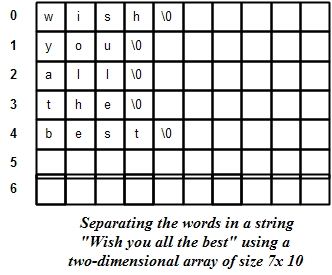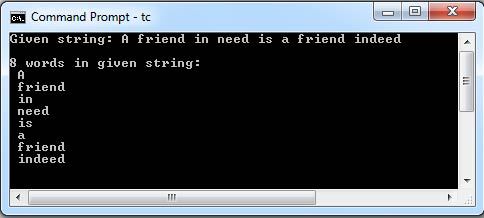Let us write function str words to accept a string and separate the words in it. The number of words in a given string as well as the number of characters in each word are not known before hand. To keep the code simple, let us assume that the given string contains at the most MAX WORD words and each word in turn contains at the most MAX_ CHAR characters. Thus, the function str words can return the words in the given string in a two-dimensional array of size MAX_ WORD x MAX_CHAR of type char, as shown in fig.

Observe the null terminators at the end of each word. Note that the operations involved in separating the words are similar to those used in the str_wcount function used to count the words in a given string. Hence, we modify the str_wcount function to separate the words and write them to the two-dimensional array parameter.
To simplify the things further, we have assumed that the given string does not contain any punctuation symbols and that the words are separated by whitespaces. Although this is a very restrictive assumption, it helps us focus on the process of word separation. The complete program is given below.
/* Separate words from a given string */
#include <stdio.h>
#include <string.h>
#include <conio.h>
#define MAX_WORD 50
#define MAX_CHAR 20
int str_words(const char *a, char words[] [MAX_CHAR]);
void init_arr(char words[] [MAX_CHAR]);
int main()
{
char *quote = “A friend in need is a friend indeed”;
char words[MAX_WORD] [MAX_CHAR];
int nwords, i;
clrscr();
nwords = str_words(quote, words);
printf(“Given string: %s\n\n”, quote);
printf(“%d words in given string:\n”, nwords);
for(i = 0; i < nwords; i++)
printf(” %s\n”, words[i]);
return 0;
}
/* separate words in a given string */
int str_words(const char *a, char words[] [MAX_CHAR])
{
int in_word; /* flag – inside a word or outside it? */
int w, c; /* position in words array for next char from string */
int i;
w = -1;
in_word = 0; /* we are not in a word */
for(i = 0; a[i] != ‘\0’; i++)
{
if (in_word == 0) /* we are not in a word */
{
if (!isspace (a[i])) /* cur char is not a white space */
{
in_word = 1; /* we are in a new word now */
c = 0;
words[++w] = a[i]; /* write first char of word in words array */
}
}
else if (isspace(a[i])) /* in a word & whitespace encountered */
{
in_word = 0; /* we are outside word now */
words[w] [++c] = ‘\0’; /* write null terminator to word */
}
else words[w] [++c] =a[i]; /*add next char to words array*/
}
words [w][++c] = ‘\0’; /* write null terminator to last word */
return w + 1; /* number of words in given string */
}
The variables w and c in str_words function are used to indicate the position in words array where the next non-whitespace character from a given string will be written. The variable w is initialized to -1. When a new word is encountered, the values of variables w and c are updated to point to the next word in words array (w is incremented and c is reset to 0). Also, when subsequent characters in a word are encountered, the variable c is incremented. The transition from one word to the next is important as we have to write a null terminator to mark the end of the current word in words array. When string processing is complete, a null terminator is written at the end of the last word in words array. Finally, the function returns the number of words in the given string. The program output is given below.

 Dinesh Thakur holds an B.C.A, MCDBA, MCSD certifications. Dinesh authors the hugely popular
Dinesh Thakur holds an B.C.A, MCDBA, MCSD certifications. Dinesh authors the hugely popular